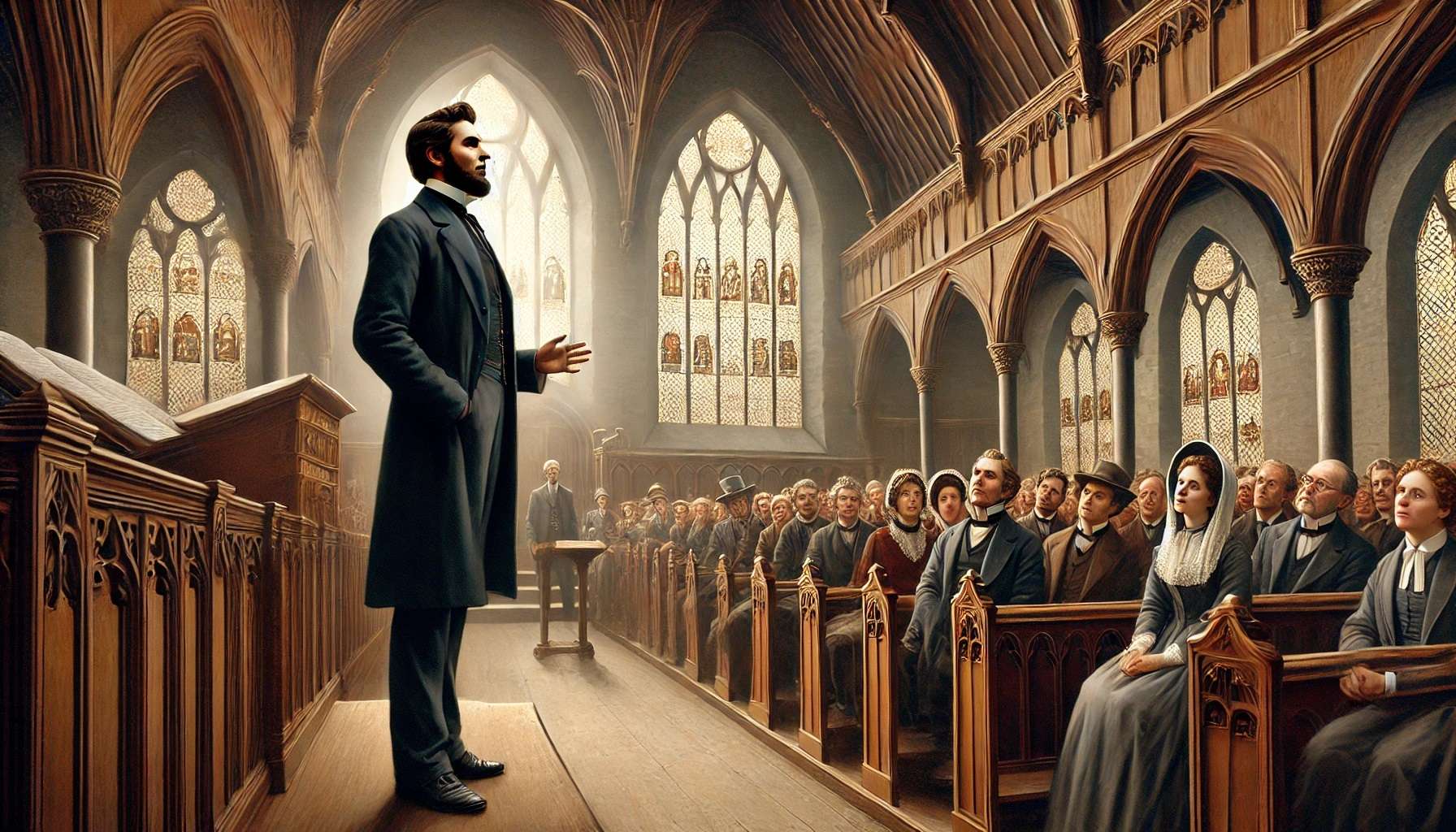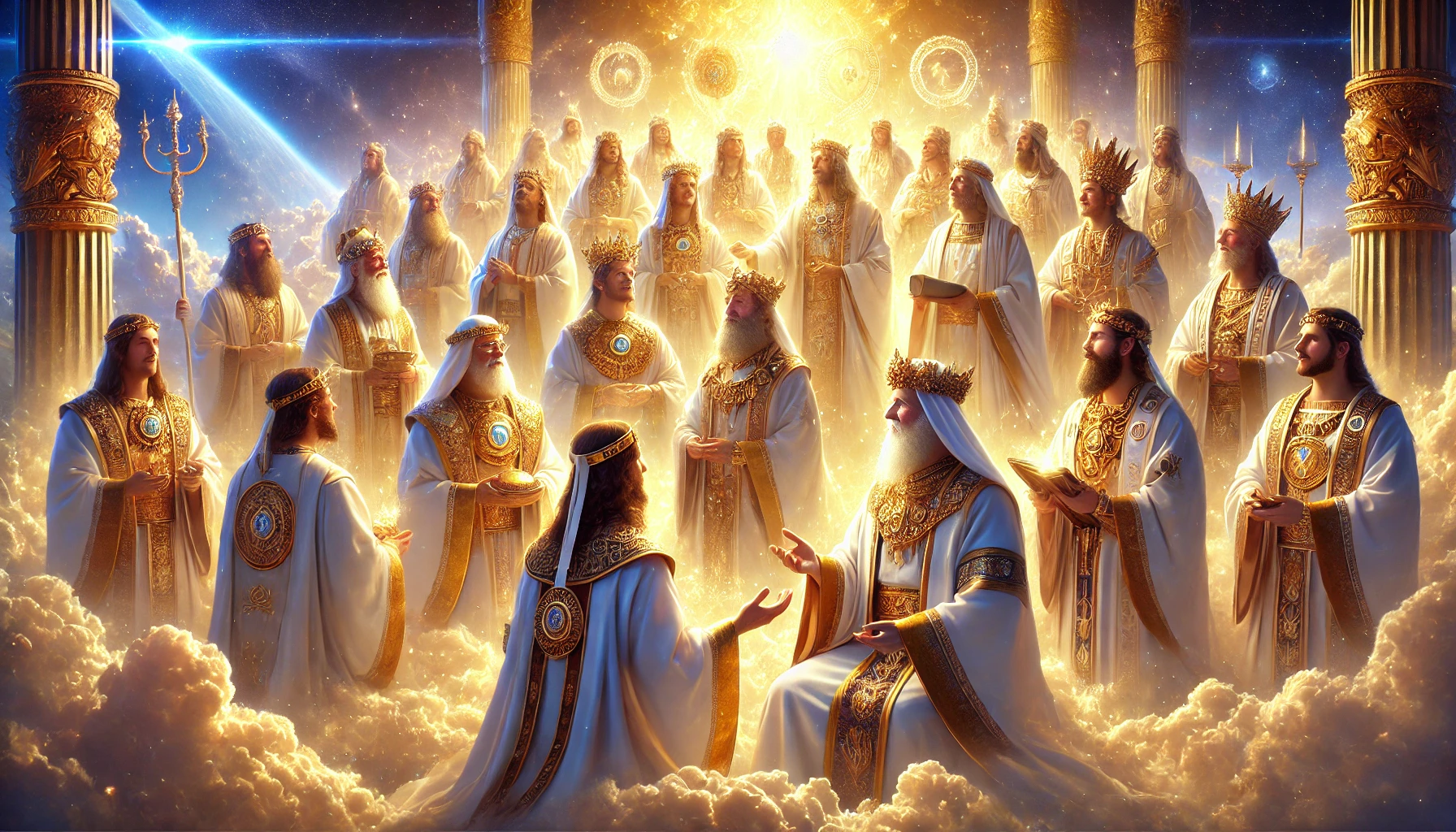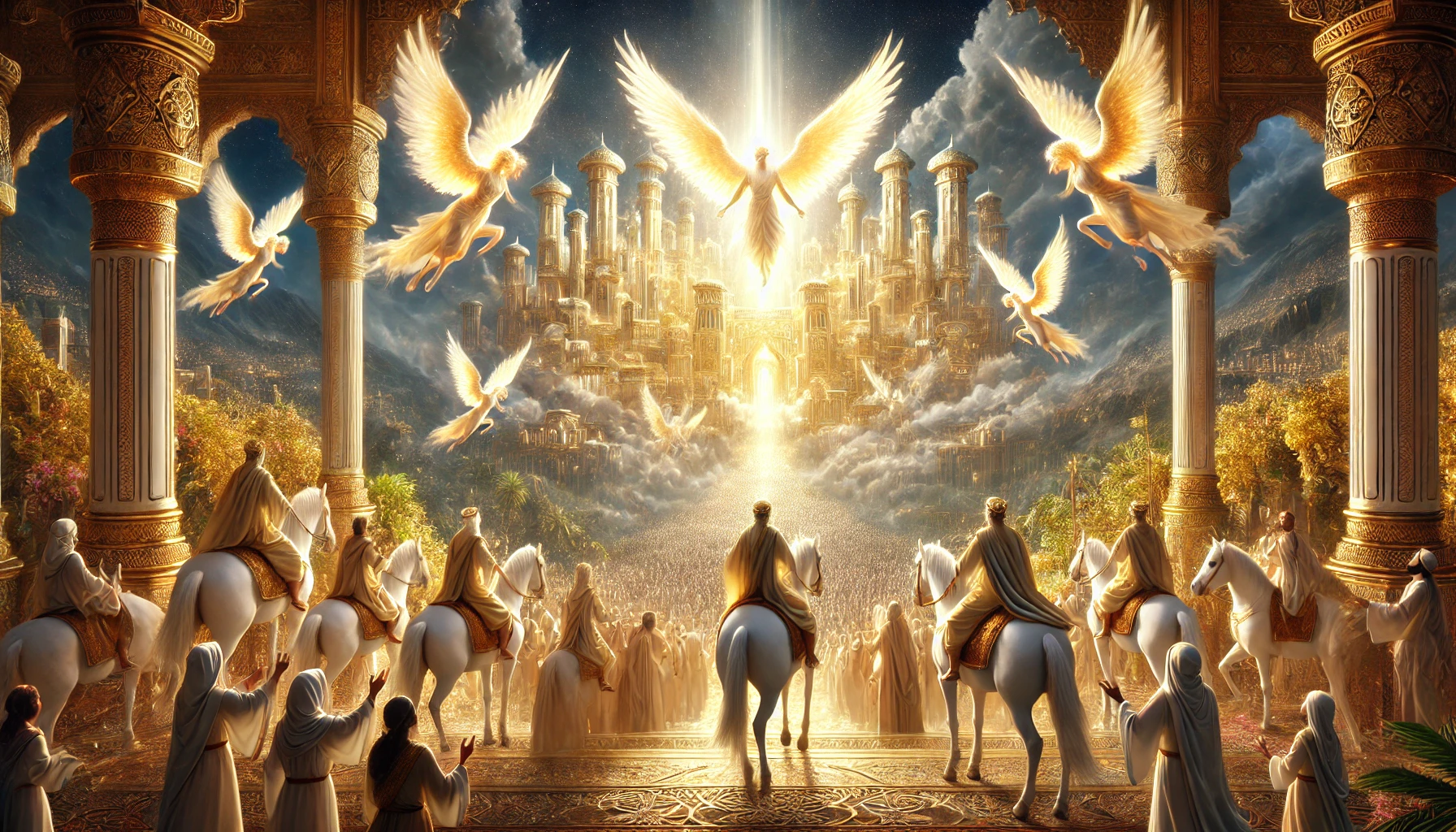John Nelson Darby was born on November 18, 1800, in Westminster, London, into an influential Anglo-Irish family. He was educated at Trinity College in Dublin, where he excelled academically before studying law. However, Darby abandoned legal practice to dedicate himself to religious ministry. His career change occurred in a historical context marked by political and religious instability in Europe, especially after the Napoleonic Wars, which altered the geopolitical map and the daily lives of nations. In this environment of spiritual searching and questioning of traditional ecclesiastical structures, Darby found fertile ground to develop and promote his ideas.
The 19th century was a time of significant change in Europe, with the Industrial Revolution in full swing, transforming societies and economies in ways few could anticipate. This era also saw the rise of religious revival movements driven by a renewed desire to return to Scripture and primitive Christianity. Darby was ordained as a priest in the Church of Ireland (Anglican) in 1825. However, he soon became disenchanted with the formal ecclesiastical structure and began seeking a simpler, Scripture-centered communion.
The environment was rife with theological exploration, and established churches faced criticism from groups seeking a more genuine and less institutionalized spirituality. The Plymouth Brethren, a movement in which Darby was a prominent figure, emerged in this context as a reaction against what they perceived as superficial and formalistic Christianity.
Darby is known for developing a literalist approach to biblical interpretation, contrasting with the allegorical or symbolic interpretations prevalent in many Christian circles of the time. This literalist approach became a cornerstone of dispensationalism, influenced by the conviction that every word of Scripture should be understood in its simplest and most direct sense. Darby’s insistence on a literal reading of prophecies and his teaching on the rapture of the Church before the tribulation introduced a new dimension to Christian eschatology. In this environment, his ideas resonated and spread among those seeking a clearer understanding of the Bible and its contemporary relevance.
Darby is also known for promoting the doctrine of the pre-tribulational rapture, which holds that the Church will be taken up before a period of tribulation on Earth. This doctrine profoundly influenced Christian eschatology, particularly in the United States, and gained popularity through various publications and Bible translations.
During his lifetime, Darby traveled extensively throughout Europe and North America, preaching and teaching his beliefs. He also translated the Bible into English, French, and German, producing what is known as the “Darby Bible.” John Nelson Darby passed away in Bournemouth, England, in 1882, leaving a lasting legacy in biblical interpretation and the development of many contemporary evangelical movements.
John Nelson Darby’s work has significantly influenced modern Christian theology, particularly in the realm of dispensationalism and the literal interpretation of biblical prophecy. Dispensationalism is a theological and hermeneutical framework that interprets human history and divine revelation by dividing it into specific periods called “dispensations.” Each of these dispensations represents an era or stage in which God interacts with and administers the world’s affairs in a particular way, assigning specific responsibilities to humanity.
Origins and Development of Darby’s Dispensations
Darby and the Plymouth Brethren promoted the idea that the Bible should be understood literally whenever possible and that God revealed His plan through a series of administrations or historical periods. While Darby’s approach to the literal interpretation of the Bible is coherent and arguably necessary to understand biblical prophecy and other scriptures, it neglected the most crucial resource for prophetic interpretation: the guidance of the Holy Spirit.
Without the Spirit of God, understanding Scripture in general is impossible. On the other hand, there is nothing in the Scriptures that indicates that Darby’s ideas regarding dispensations hold significant value in understanding the Bible. God has dealt differently with humanity both generally and individually, which could be interpreted as eras or periods—for instance, the Babylonian captivity or the Exodus. However, these stages, while important in their time, are not separate dispensations but rather parts of God’s overarching plan.
According to Darby, however, history is divided into distinct dispensations, each marked by a specific covenant or interaction between God and humanity. While some theologians differ on the number of dispensations he proposed, the most commonly accepted version is as follows:
- The Dispensation of Innocence
From the creation of Adam and Eve to their fall into sin (Genesis 1:28; Genesis 3:6). In this dispensation, humanity lived in a state of innocence and obedience to God. - The Dispensation of Conscience
From the expulsion from Eden to the flood (Genesis 3:7; Genesis 8:14), during which humans followed their consciences, yet sin multiplied rapidly. - The Dispensation of Human Government
From the end of the flood to the dispersion at Babel (Genesis 8:15; Genesis 11:9). Here, humanity was given the responsibility of governing itself under God’s direction. - The Dispensation of Promise
From Abraham’s calling to the giving of the Law at Sinai (Genesis 12:1; Exodus 19:25). God made a covenant with Abraham and his descendants. - The Dispensation of the Law
From the giving of the Mosaic Law to the crucifixion of Jesus (Exodus 20; Matthew 27:50). During this dispensation, the people of Israel lived under the Law of Moses. - The Dispensation of Grace
From Christ’s sacrifice to the rapture of the Church (Acts 2; Revelation 3). This is the current dispensation, in which salvation is offered by grace through faith in Jesus Christ. - The Dispensation of the Millennial Kingdom
From Christ’s second coming to the end of the millennium (Revelation 20:1-6). A future period during which Christ will reign on Earth for 1,000 years.
Despite Darby’s systematic separation of distinct periods or dispensations, Scripture presents only two periods that are historically and spiritually significant in terms of God’s direct intervention with humanity and are clearly defined. The first is marked by the old covenant between God and the people of Israel, and the second by the new covenant with all humanity through the perfect sacrifice of Jesus Christ. Thus, apart from the didactic value of Darby’s dispensational system, it does not represent a significant theological contribution.
Dispensationalism also makes a clear distinction between the people of Israel and the Church.
A central principle of dispensationalism is the distinction between Israel and the Church, two entities that, according to this theological framework, have distinct roles and destinies in God’s divine plan. Dispensationalists hold that the promises made to Israel in the Old Testament, such as the restoration of the kingdom and the possession of the Promised Land, should be understood literally and will be fulfilled in the future. In fact, Darby was not mistaken about the possession of the Promised Land, as Israel became a sovereign nation in 1948. Darby viewed Israel as God’s chosen people with a specific purpose, including the prophetic fulfillment of its restoration as a nation, but excluded it from the plan of redemption through Jesus Christ.
However, Israel became the Lord’s church, not by generational inheritance but through faith. As Scripture says, “He came unto his own, and his own received him not.” John 1:12. Many believe that because the Jews rejected Him, God abandoned them from His plans. This is completely incorrect, as the apostle John continues, “But as many as received him, to them gave he power to become the sons of God, even to them that believe on his name.” John 1:13. Israel will not be saved as a nation in general but only those who believe in His name.
Nevertheless, Darby considered Israel an entity independent of the plan of redemption. He believed it would inherit the Promised Land but not the promise of eternal life and the role of co-ruling with Jesus Christ in the millennial kingdom.
On the other hand, the Church is seen as a “parenthesis” in redemptive history—a unique entity separate from Israel that arises as a mystery revealed in the New Testament, beginning at Pentecost and continuing until the rapture. Scripture explicitly states that God has not rejected Israel from His redemptive plan through Jesus, as the apostle Paul affirms in Romans 11:1-2: “I say then, Hath God cast away his people? God forbid. For I also am an Israelite, of the seed of Abraham, of the tribe of Benjamin. God hath not cast away his people which he foreknew.”
Darby made this distinction between Israel and the Church. Although he claimed his interpretation was based on a literal understanding of Scripture, it appears he overlooked this verse. While literalism was essential to dispensationalism, he ignored other verses that confirm the promises and covenants were given to the people of Israel, and the heirs of these covenants and promises are the Israelites, not other nations. Ephesians again mentions Israel as the recipient of the promises and alludes to the fact that the plan of redemption was intended for the Jewish people, not for Gentile nations.
In Ephesians 2:12, Paul says: “That at that time ye were without Christ, being aliens from the commonwealth of Israel, and strangers from the covenants of promise, having no hope, and without God in the world.” This verse highlights that the Gentiles, before Christ, were separated from the “commonwealth of Israel” and “strangers from the covenants of promise.” This implies that Israel is the sole recipient of God’s covenants and promises, and now, through Christ, Gentiles can also partake in those promises. In fact, the disciples were Jewish, and some, including Peter, were surprised that God allowed Gentiles to participate in the new covenant, as declared in the book of Acts.
In Peter’s vision in Acts 10:9-16, he is praying on the rooftop of a house in Joppa. He sees a large sheet descending from heaven, containing all kinds of animals, and a voice says to him: “Rise, Peter; kill, and eat.” Peter replies that he has never eaten anything impure, but the voice says: “What God hath cleansed, that call not thou common.” This vision occurs three times.
The interpretation of the vision becomes clearer later, when Peter understands that it was not only about food but about the acceptance of Gentiles into God’s new covenant.
The literalism, which was a cornerstone of Darby’s teaching, also seems to have overlooked what is stated in Hebrews 8:10: “For this is the covenant that I will make with the house of Israel after those days, saith the Lord; I will put my laws into their mind, and write them in their hearts: and I will be to them a God, and they shall be to me a people.” This verse refers to the new covenant that God promised to Israel, showing that the new plan of redemption would no longer be written on tablets of stone but in the hearts of every believer, both Jews and Gentiles.
Advocates of dispensationalism apply an interpretive methodology known as the grammatical-historical method, which seeks to understand biblical texts in their clearest and most direct sense, unless the context demands a symbolic or metaphorical meaning. This approach is considered particularly important in studying biblical prophecies, as it avoids allegorical interpretations and emphasizes a literal fulfillment of the promises and judgments described in books like Daniel and Revelation.
The insistence on this method reinforces the belief that the specific details of prophecies must be fulfilled concretely and not merely in a spiritual or symbolic sense. While this is theoretically a valid approach, it suppresses the most crucial aspect of prophetic interpretation, which the apostle Peter explains: “Knowing this first, that no prophecy of the scripture is of any private interpretation. For the prophecy came not in old time by the will of man: but holy men of God spake as they were moved by the Holy Spirit.” 2 Peter 1:20-21.
In other words, no one can write a prophecy unless inspired by God, and likewise, no one can interpret a prophecy unless it has been revealed to them by the Holy Spirit. Thus, it is impossible to interpret a prophecy through didactic methods or schools of thought; the only way to interpret a prophecy is if God reveals it to you. There is no other method. “These things saith he that is holy, he that is true, he that hath the key of David, he that openeth, and no man shutteth; and shutteth, and no man openeth.” Revelation 3:7. Therefore, if God does not open a prophecy for interpretation, no one will be able to understand it.
Theology of the Dispensation of Grace
The dispensation of grace, also known as the Church Age, is considered the most significant for contemporary Christians, as it spans from the death and resurrection of Jesus Christ to the rapture of the Church. This dispensation marks a dramatic change in the relationship between God and humanity, differing from previous dispensations where obedience to the Mosaic Law and rituals was central.
During this period, salvation is obtained solely by God’s grace through faith in Jesus Christ, as emphasized in Ephesians 2:8-9: “For by grace are ye saved through faith; and that not of yourselves: it is the gift of God: Not of works, lest any man should boast.”
Although I have explained in other studies that this verse does not refer to works of mercy, I want to highlight that it was the same apostle who clarified that human redemption no longer comes through works of the law. In Galatians 2:16, Paul explains: “Knowing that a man is not justified by the works of the law, but by the faith of Jesus Christ, even we have believed in Jesus Christ, that we might be justified by the faith of Christ, and not by the works of the law: for by the works of the law shall no flesh be justified.”
Thus, the works referred to by the apostle Paul in Ephesians 2 are the rituals of the law, meaning that animal sacrifices no longer have the capacity to redeem humanity as they did during the time of the law. Therefore, it is important to remind you of what James 2:26 mentions: “For as the body without the spirit is dead, so faith without works is dead also.”
This means that believing in Jesus is not enough; works of mercy are also necessary for salvation. “Seest thou how faith wrought with his works, and by works was faith made perfect? … Ye see then how that by works a man is justified, and not by faith only.” James 2:22-24. In other words, both faith and works are necessary to achieve salvation—not faith alone, nor works alone—because they work together and perfect one another.
Therefore, Darby’s concept of the dispensation of grace is another highly damaging fallacy, as it leads Christians to believe that works of mercy are unnecessary—that it is enough to help in Sunday services, have faith in Jesus Christ, and pay tithes. This, obviously, distances us from Jesus’ commandments and, consequently, from salvation.
In the modern context, the dispensation of grace has shaped the identity and practices of the Christian Church, emphasizing evangelism, discipleship, and community life. While this aligns partially with what we call the Great Commission, it does not fully conform to the customs of the early Christians as reflected in the book of Acts.
The emphasis on grace as the foundation of salvation has also influenced how modern Christians approach social and cultural issues. By focusing on God’s unconditional acceptance and love, many churches have adopted more inclusive stances, to the extent of endorsing permissive attitudes, believing that God can overlook sin as an expression of His unconditional love.
Scripture combats sin in all its forms, yet the grace preached today often appears to be a license for indulgence rather than an opportunity for repentance. Scripture condemns all forms of sin, seeing it as a barrier to attaining eternal life: “Know ye not that the unrighteous shall not inherit the kingdom of God? Be not deceived: neither fornicators, nor idolaters, nor adulterers, nor effeminate, nor abusers of themselves with mankind, nor thieves, nor covetous, nor drunkards, nor revilers, nor extortioners, shall inherit the kingdom of God.” 1 Corinthians 6:9-10.
The acceptance of sin as part of a faith community can never be considered part of God’s grace. On the contrary, sin within churches must be regarded as a manifestation of the power of darkness, because: “He that committeth sin is of the devil; for the devil sinneth from the beginning. For this purpose, the Son of God was manifested, that he might destroy the works of the devil.” 1 John 3:8.
The Dispensation of the Millennial Kingdom in Darby’s Theology
The dispensation of the millennial kingdom is a fundamental aspect of dispensationalist eschatology and, according to John Nelson Darby’s theology, represents the culmination of the divine plan in human history. This future period, described in detail in the book of Revelation, particularly in Revelation 20:1-6, refers to a thousand-year era during which Jesus Christ will physically reign on Earth.
According to Darby, this time will be a literal fulfillment of the promises made to Israel in the Old Testament and a demonstration of God’s perfect governance over the world. The millennium was prophesied during the time of the prophets, particularly by the prophet Isaiah, and was reaffirmed to the Church in the New Testament, specifically in the book of Revelation.
Within the dispensationalist framework, the millennial kingdom follows the period of tribulation—a time of global judgment and suffering that precedes Christ’s second coming. During this triumphant return, Jesus will establish His kingdom, marking the beginning of the millennial dispensation. Darby maintained that this stage would be a time of unprecedented peace and prosperity, in which divine justice would prevail on Earth and all the promises made to the patriarchs and prophets would be fulfilled literally. Israel would occupy a central role in this kingdom, restored to its promised land and elevated to a position of prominence among the nations.
One of the most significant aspects of the millennial kingdom in Darby’s theology is the distinction between the Church and national Israel. Darby taught that while the Church, composed of all believers in Christ, would have been raptured before the tribulation, Israel would remain on Earth and face the judgments described in Revelation. However, after Christ’s return, the Israelites would recognize Jesus as the promised Messiah and partake in the blessings of the millennial kingdom.
Although this interpretation by Darby regarding Israel also lacks biblical basis, as previously mentioned, it reflects the rejection the Jewish people faced in Europe during the 19th century. Darby was convinced that Israel had been excluded from God’s new covenant for rejecting their Messiah and that, in turn, the Gentile Church was the heir of all promises—a notion that is entirely false. He could not conceive of Christianity within a Jewish context, much less that the promises of eternal life were made exclusively to the people of Israel.
According to Darby, the role of the Church, which will have been reigning alongside Christ from heaven, will be to co-rule and serve as a testimony to God’s faithfulness to His promises. This approach by Darby regarding the millennium has biblical support, but the idea that the Church as a whole will be co-rulers with Jesus from heaven lacks scriptural backing. However, we can mention that the Word of God does state that many will be co-heirs with God, but not in heaven—rather, on Earth, as described in Revelation 21:3-4: “And I heard a great voice out of heaven saying, Behold, the tabernacle of God is with men, and he will dwell with them, and they shall be his people, and God himself shall be with them, and be their God. And God shall wipe away all tears from their eyes; and there shall be no more death, neither sorrow, nor crying, neither shall there be any more pain: for the former things are passed away.” This passage describes the final state in which God will dwell with His people in the new creation and will reign eternally on Earth.
The vision of a millennial reign where Christ would reign with humanity on Earth deeply influenced 19th-century Christian eschatology, though not as much among 21st-century believers, especially within the charismatic movement, where the focus lies on the hope of a secret rapture.
The Great Tribulation in God’s Plan and Darby’s Dispensationalist Interpretation
According to John Nelson Darby and the dispensationalist theology he developed, Israel plays a central and distinctive role in the events encompassing the tribulation, the rapture, and the millennium. Darby taught that after the rapture of the Church—which would involve the departure of all believers to heaven before the tribulation—Israel would remain on Earth to face this period of judgment and suffering.
The tribulation is a time of great distress that would last seven years and is intended to test and purify humanity. However, this period would have a particular focus on Israel, as it would be seen as a time of discipline and preparation for the Jewish people to finally recognize Jesus Christ as their Messiah. Although the prophecy of Daniel’s 70 weeks has been a subject of speculation and misinterpretation, it should not be assumed that the great tribulation will last seven years, as other interpretations suggest it will last 42 months or 3 ½ years.
Darby viewed the tribulation as a moment when Israel would be subjected to persecution and hardship, but it would also be a time when God would renew His dealings with them. According to Darby, events such as the rise of the Antichrist and the desecration of the temple in Jerusalem would be key elements leading the Jewish people to a point of repentance and recognition of Christ. As the tribulation nears its end, Darby taught that a significant portion of the people of Israel would turn to Christ, acknowledging Him as the promised Messiah. This is based on passages like Zechariah 12:10, which states: “And I will pour upon the house of David, and upon the inhabitants of Jerusalem, the spirit of grace and of supplications: and they shall look upon me whom they have pierced, and they shall mourn for him, as one mourneth for his only son…”
This national recognition and repentance would be a key step in preparing Israel for the arrival of the millennial kingdom. During this time, the surviving Jews who had accepted Christ would join the faithful remnant that would be part of the kingdom. According to Darby, Israel would be punished for their unbelief and would not be allowed to participate in the rapture. The nation of Israel will recognize Jesus as their Messiah before His return. Like Darby, we believe that Israel will go through a period of great anguish and need, which will serve as a catalyst for the entire nation to seek God and repent.
The Word of God states that until the fullness of the Gentiles has been saved, Israel will also be saved. They will recognize that Jesus is Lord, so we should not think that only the Gentile Church is part of God’s plan. Romans 11:25-26 says: “For I would not, brethren, that ye should be ignorant of this mystery, lest ye should be wise in your own conceits; that blindness in part is happened to Israel, until the fulness of the Gentiles be come in. And so all Israel shall be saved: as it is written, There shall come out of Sion the Deliverer, and shall turn away ungodliness from Jacob.”
In the millennium, Jerusalem would become the spiritual and political center of the world, and Christ would reign from there, fulfilling messianic promises. The temple in Jerusalem would be rebuilt, and worship there would be conducted through all the rites described in the law of Moses, based on the descriptions in Ezekiel 40-48. Israel, as a nation, would play a prominent role by serving as a mediator of blessings for Gentile nations and as a testimony to God’s faithfulness to His covenants. The construction of a new temple in Jerusalem implies a return to the ancient practices outlined in the law of Moses. According to Darby, Israel would continue worshiping God according to the Old Testament rather than in accordance with Christ’s redemptive work in the New Testament.
This includes a return to the practice of animal sacrifices, a topic we explored extensively in our study titled Will a Third Temple Be Built in Jerusalem?
Darby and dispensationalists argue that this third temple will be rebuilt by the people of Israel as part of the preparation for the final events before the second coming of Christ. The rebuilding of the temple is seen as a crucial step in fulfilling prophecies about the tribulation period, during which the Antichrist will make a covenant with Israel and later break it, desecrating the temple. Darby did not understand that the temple referred to by Ezekiel is not a temple made of stones but a spiritual one. This does not imply an over-spiritualization of Scripture but rather a literal interpretation, as Paul states: “Know ye not that ye are the temple of God, and that the Spirit of God dwelleth in you?” 1 Corinthians 3:16.
For Darby, the reconstruction of the temple in Jerusalem not only fulfilled biblical prophecies but also symbolized the restoration of Jewish religious practices and Israel’s centrality in God’s eschatological plans. This idea underscores the dispensationalist belief that God has a separate and ongoing plan for Israel that will be fulfilled in the end times, distinguishing it from the Church, which will have been raptured before the tribulation begins.
Darby’s idea of a pre-tribulation rapture has millions of enthusiasts across various denominations, but it lacks a solid foundation in Scripture. On the other hand, the notion that the people of Israel will resume animal sacrifices is a widespread aspiration among modern Jews, but it should not be confused with God’s plans, which do not include a return to the law of Moses. The practice of animal sacrifices was not only interrupted two thousand years ago but was entirely abolished by the one and only sacrifice of the Lamb of God.
Hebrews 8:6-13 says: “But now hath he obtained a more excellent ministry, by how much also he is the mediator of a better covenant, which was established upon better promises. For if that first covenant had been faultless, then should no place have been sought for the second … In that he saith, A new covenant, he hath made the first old. Now that which decayeth and waxeth old is ready to vanish away.”
Believing that Israel will build a new temple and that, following this event, the practice of animal sacrifices will resume is heresy. It tramples on the sacrifice of Jesus and treats as unclean the blood He shed on the cross of Calvary. Hebrews 10:29 says: “Of how much sorer punishment, suppose ye, shall he be thought worthy, who hath trodden under foot the Son of God, and hath counted the blood of the covenant, wherewith he was sanctified, an unholy thing, and hath done despite unto the Spirit of grace?”
Why, then, did Jesus die? If Israel returns to sacrificing animals to try to attain redemption for their sins, Christ’s sacrifice was in vain. This idea is utterly absurd and is invalidated by the statements of the author of the book of Hebrews.
Hebrews 9:11-14 says: “But Christ being come an high priest of good things to come, by a greater and more perfect tabernacle, not made with hands, that is to say, not of this building; neither by the blood of goats and calves, but by his own blood he entered in once into the holy place, having obtained eternal redemption for us. For if the blood of bulls and of goats, and the ashes of an heifer sprinkling the unclean, sanctifieth to the purifying of the flesh: how much more shall the blood of Christ, who through the eternal Spirit offered himself without spot to God, purge your conscience from dead works to serve the living God?” This means that the tabernacle of God is not, nor will it ever be, a building made of stones, just as the sacrifice of Jesus is, and will always be, the only acceptable sacrifice before God.
The Theology of Darby’s Pretribulational Rapture
Darby described the rapture as a sudden and secret event in which believers in Christ—both those who had died in faith and those who were alive at the time—would be taken to heaven to meet the Lord in the clouds. This teaching is based on interpretations of passages like 1 Thessalonians 4:16-17, which states: “For the Lord himself shall descend from heaven with a shout, with the voice of the archangel, and with the trump of God: and the dead in Christ shall rise first. Then we which are alive and remain shall be caught up together with them in the clouds, to meet the Lord in the air: and so shall we ever be with the Lord.”
Darby envisioned the rapture as an event distinct and separate from the second coming of Christ. While the rapture would involve only the Church and occur secretly and suddenly, the second coming would be visible and public, marking Christ’s return to judge the nations and establish His millennial kingdom. According to Darby, the rapture served as a way to protect the Church from the divine wrath and judgment that would come during the tribulation.
This teaching is rooted in the idea that God has not destined the Church to experience the judgment meant for ungodly humanity and rebellious nations. 1 Thessalonians 5:9 emphasizes: “For God hath not appointed us to wrath, but to obtain salvation by our Lord Jesus Christ.” Darby’s teaching on the rapture was innovative in his time and became one of the most well-known and debated doctrines of dispensationalism. Although lacking a solid biblical foundation, Darby’s ideas about the rapture of the Church have become dogma in many modern congregations.
While the idea of a pretribulational rapture is widespread today, in the 19th century, it was a novel concept, as no one before him had suggested such a thing. There are no records indicating that the pretribulational rapture was a doctrine taught in earlier centuries. Thus, the doctrine of a pretribulational rapture as we know it today is owed entirely to John Nelson Darby, not to the Word of God.
If you would like to know why not all Christians will be raptured, listen to our study titled: The Rapture of the Church.
A Brilliant Strategy That Spread Darby’s Ideas: The Scofield Bible
The pretribulational rapture was disseminated and gained popularity, especially in the United States, through the Scofield Reference Bible, published by Cyrus I. Scofield, a follower of Darby’s teachings. This study Bible incorporated Darby’s ideas into its notes, leading to the widespread adoption of the doctrine of the rapture in many evangelical churches. The rapture has also influenced popular culture, inspiring books, movies, and debates about eschatology and the end times.
Cyrus I. Scofield was a key figure in the dissemination and consolidation of dispensationalism, particularly the ideas developed by John Nelson Darby, through the publication of the Scofield Reference Bible in 1909. Scofield, an American pastor, theologian, and writer, recognized the importance of a resource that could present dispensationalism in an accessible and systematic way to ordinary readers. To achieve this, he decided to incorporate explanatory notes and commentary directly into the Bible, setting a precedent for how Scripture would be studied and understood in the 20th century and beyond.
Scofield lived during a time when evangelical Christianity in the United States was experiencing a revival and increasing attention to eschatology, driven by religious awakenings and concerns about end-times events. The second half of the 19th century and the early 20th century were periods of significant social, economic, and political change, leading many to seek answers in Scripture. Influenced by Darby’s teachings, Scofield saw an opportunity to present an interpretive system that addressed the complexities of the Bible with a methodical and literal approach.
The Scofield Reference Bible was innovative in its design, as it included biblical text interspersed with commentary explaining dispensationalist ideas. This format allowed readers to view Scripture alongside Scofield’s notes, making dispensationalist interpretations appear as an integral part of the biblical text. The notes not only explained passages and placed them within Darby’s dispensationalist framework, but also presented a clear outline of the different “dispensations” or eras throughout biblical history. These dispensations included periods such as Innocence, Conscience, Human Government, Promise, Law, Grace, and the Millennial Kingdom.
Scofield incorporated Darby’s teachings, including the literal interpretation of Scripture, the distinction between Israel and the Church, and futurist eschatology, into his notes and commentary.
The inclusion of these teachings in a study Bible format made Darby’s ideas more accessible and persuasive. Unlike interpretations found in separate books or independent theological commentaries, Scofield’s notes were integrated directly with the biblical text, creating the impression that dispensationalist interpretations were a natural and authoritative part of Scripture itself. This strategy proved to be highly effective in popularizing dispensationalism, especially in the United States, where the Scofield Reference Bible was widely distributed and became one of the most influential study Bibles of its time.
The impact of the Scofield Reference Bible also extended to Christian education and seminaries, where dispensationalist notes and teachings were used as foundational material for theological training. This influence contributed to the spread of dispensationalist thought worldwide, shaping preaching, Bible studies, and Christian publications throughout much of the 20th century.
Scofield’s work, by presenting dispensationalism in a comprehensible and practical way, ensured that Darby’s ideas had a lasting influence on evangelical Christianity, solidifying their place as one of the main eschatological and theological interpretations in many denominations and Christian communities.
The direct integration of Darby’s ideas with the biblical text allowed them to be assimilated coherently with the rest of Scripture; in this way, Scofield succeeded in placing his explanations within the Bible itself. Scofield made his interpretations appear almost as part of the biblical text. This made dispensationalist ideas, such as the separation between Israel and the Church and the concept of the pretribulational rapture, seem like “natural” interpretations of the text. By reading the notes alongside the biblical text, many readers assumed that these interpretations were faithful to the original message of Scripture.
Another advantage was its accessibility to laypeople. The Scofield Reference Bible made it easier to understand complex theological concepts and summarized dispensationalist ideas in an accessible way. Scofield explained the dispensations simply, making his teachings understandable and appealing to ordinary readers who might not have sought these ideas in other theological books.
The promotion of literal interpretation through Scofield’s notes encouraged a literal reading of prophecies and the dispensationalist structure. This approach helped readers view the text as an organized and detailed plan of God for history and the future. This structure helped believers interpret difficult passages and provided a sense of order within the biblical narrative.
Few could doubt that the notes written in a Bible might be incorrect or incomplete, due to the culture of trust in study Bibles. In Protestant and evangelical circles, study Bibles are highly valued because they offer explanations for complex passages. The Scofield Reference Bible became one of the most influential study Bibles of its time, setting a precedent for other Bibles to include interpretive notes in their editions.
The Scofield Reference Bible was used in churches, seminaries, and Bible studies, contributing to dispensationalism becoming one of the leading eschatological interpretations in modern evangelical Christianity, especially in North America. Even today, dispensationalism remains influential and has shaped eschatology, theology, and support for Israel within much of evangelical Christianity.
Moreover, the Scofield Reference Bible helped other theologians and Christian leaders adopt and teach these doctrines in their own churches and ministries, creating a network of support that amplified the dispensationalist ideas of Darby and Scofield worldwide.
The Impact of Dispensationalism on 21st-Century Christianity
Dispensationalism has had a notable impact not only on theology but also on contemporary Christian culture. Authors like Tim LaHaye and Jerry B. Jenkins brought dispensationalist ideas to the general public through the Left Behind series of novels, which depict imagined events that could occur after the rapture and during the tribulation. These novels became bestsellers and helped popularize the concept of the rapture and dispensationalist eschatology among millions of Christians worldwide.
The introduction of dispensationalism by John Nelson Darby and its subsequent popularization through the Scofield Reference Bible, alongside contemporary works like Left Behind by Tim LaHaye and Jerry B Jenkins, have changed the way many Christians read and understand the Bible. Tim LaHaye was a staunch advocate of dispensationalism and believed in the literal interpretation of the Bible, particularly regarding eschatological prophecies. In his view, the pretribulational rapture is an event where Christians would be taken to heaven before a period of tribulation on Earth, forming an essential part of the interpretation of the end times.
His novels were immensely popular, selling millions of copies and being translated into several languages. Their influence helped bring dispensationalism and the doctrine of the rapture to a broader audience, extending beyond academic and pastoral Christian communities. The series was adapted into films and dramatizations, further expanding its reach and sparking discussions about biblical eschatology in popular culture.
The legacy and influence of dispensationalism have had a lasting impact on modern Christian eschatology and the way Christians view end-times events. Its influence has made terms such as “rapture,” “tribulation,” and “Antichrist” commonplace among Christians, shaping sermons, Bible studies, and contemporary eschatological literature.
The heritage of dispensationalism in the collective consciousness of 21st-century Christians has had a profound impact. While the emphasis on a literal approach to certain biblical texts and the concrete fulfillment of promises, including Christ’s millennial reign on Earth, is commendable, the unfounded belief that God has two different plans—one for the Church and another for the nation of Israel—is entirely false.
Additionally, the theory of a pretribulational rapture, a tribulation directed exclusively at the people of Israel and Gentile nations, and the construction of a third temple in Jerusalem are lies that have grown and multiplied to incalculable proportions, all stemming from the imagination of John Nelson Darby. Unfortunately, this giant called Dispensationalism is so large and strong that it seems to intimidate anyone who dares to contradict it.
The result of dispensationalism in our era has been devastating. Churches, accustomed to repeating what they have learned for decades—especially in Pentecostal, charismatic, Baptist, and other evangelical denominations—have generated baseless expectations, particularly the belief that they could be raptured at any moment. Tragically, many devout and sincere Christians believe the falsehoods invented by John Nelson Darby, promoted by Cyrus I. Scofield through his Bible, and later replicated by authors like Tim LaHaye and Jerry B. Jenkins.
My advice is this: read the Bible, ask the Lord to open your understanding, do not trust in famous names; instead, place all your trust and faith in Jesus, and ask Him to reveal to you the things that must soon come to pass. John 16:13 says: “Howbeit when he, the Spirit of truth, is come, he will guide you into all truth: for he shall not speak of himself; but whatsoever he shall hear, that shall he speak: and he will shew you things to come.”
If you receive the baptism in the Holy Spirit, He will guide you into the truth so that you can distinguish truth from falsehood. Many preachers in the past had the best intentions of guiding believers away from the Catholic Church and its various branches, as was the case with John Nelson Darby. His effort, valid and appreciated by many, left a lasting legacy, though mistaken in some aspects.
What is important is to recognize that humans can fail, but when the anointing of God through His Spirit enables us to understand His Word, we must persevere in it and not continue in man-made doctrines. “But the anointing which ye have received of him abideth in you, and ye need not that any man teach you: but as the same anointing teacheth you of all things, and is truth, and is no lie, and even as it hath taught you, ye shall abide in him.” 1 John 2:27.
![]()








